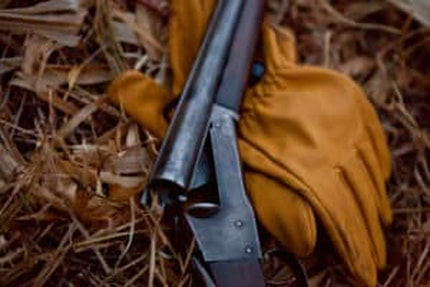Bill to sever wildlife funding from firearms sales hits pushbackBy KELLY BOSTIAN
For the CCOF Second Amendment political fireworks sprayed into the realm of wildlife conservation funding heading into the holiday weekend. But some expect the plan that would kill an 85-year-old American tradition will only fizzle. Oklahoma U. S. Rep Markwayne Mullin joined 57 other House Republicans in co-sponsoring a bill that would eliminate firearms and ammunition excise taxes from a historic conservation funding model and reallocate $800,000 in revenue from federal offshore oil and gas leases to fill the gap. In introducing H.R. 8167, Rep. Andrew Clyde, R-Ga., declared the 1937 Pittman-Robertson Act an infringement on Second Amendment rights. The bill is named the “RETURN (Repealing Excise Tax on Unalienable Rights Now) our Constitutional Rights Act of 2022.” Rep. Mullin’s office replied with a note of the emphasis on the bill’s intent to substitute another funding source and provided a final copy of the bill’s text, which was not available on the Congress.gov website Friday afternoon. A long history Recognized as the original federal funding backbone for the North American model of wildlife conservation, the Federal Aid in Wildlife Restoration Act, or Pittman-Robertson Act, raised billions through 10 to 11% taxes on guns, ammunition, and archery equipment. The program is directly credited for saving populations of white-tailed deer, elk, wild turkeys, waterfowl, and other wildlife when conservation movements were in their infancy. Social media among local and national sportsmen’s groups exploded with alarm over the bill as media outlets picked up on the story Friday. Concern focused on the thought that recreational and self-defense shooters now far outnumber those who purchase firearms for hunting. “It’s a terribly misguided piece of legislation,” said Mark Oliva, managing director of public affairs at the National Shooting Sports Foundation. “This is not anything that the NSSF or firearms or ammunition manufacturers would support,” he said. “We are very proud of the contributions the industry has made to wildlife conservation since 1937, which tops $15 billion as of today. We would never trade the value and benefits we’ve provided to wildlife management that it has brought. Sportsmen and sportswomen nationwide are very proud of that contribution.” Funding for states The excise tax funds are distributed to state wildlife management agencies for wildlife research, habitat improvements, and acquisitions and are, arguably, the most important source of conservation funding nationwide. With firearms sales at an all-time high, the tax netted a record $1.1 billion in 2021, according to Department of Interior news releases. Fiscal year distributions of PR funds to the Oklahoma Department of Wildlife Conservation were 14.3 million in fiscal 2021. That increased to $22.6 million in the 2022 fiscal year, which just closed, according to Nels Rodefeld, Wildlife Department communications and education chief. Distribution amounts to the individual states vary by year depending on available funds and whether large projects are approved and launched during that particular year, he said. “We, like every state fish and wildlife agency, rely heavily on PR funding to provide hunting and shooting opportunities so we will certainly watch this legislation and are willing to work with all elected officials to discuss the potential impacts on the North American model of conservation,” he said. “Unlike many states, here at the Oklahoma Department of Wildlife Conservation, we do not receive any general state appropriations so the significance of these funds is magnified.” 2nd Amendment connection In announcing the bill, Clyde, a gun shop owner, issued the following statement: “In case my Democrat colleagues forgot, the Bill of Rights enumerates rights to which the government cannot infringe. Unquestionably, infringement exists when the government taxes those rights to limit the people’s ability to exercise them… I firmly believe that no American should be taxed on their enumerated rights, which is why I intend to stop the Left’s tyranny in its tracks by eliminating the federal excise tax on firearms and ammunition.” The bill may be a shot across the bow in answer to Rep. Don Beyer, D-Va., who recently introduced the Assault Weapons Excise Tax, which proposed a 1,000% tax on semi-automatic firearms and large-capacity magazines. Clyde mentioned the bill in an opinion piece issued shortly before filing his own bill. Oklahoma 2nd Amendment Association President Don Spencer said he appreciated the spirit of Clyde’s bill. However, he said he expected a lot of pushback on such a momentous change and that this was likely “understandable, very understandable, political theater.” “I don’t see it going anywhere,” he said. “Our thing is we have pushed for years for state legislation to change the state constitution so it clearly says we will not accept any additional special taxation or registration fees on firearms outside of standard sales taxes.” Millions responded Teddy Roosevelt Conservation Partnership President Whit Fosburgh, said Spencer’s characterization of the bill as political theater was “well stated.” Still, the group provided a copy of a letter against the bill and supporting the user-pay spirit of Pittman-Robertson. Forty-one national outdoor sports, shooting, and conservation groups representing millions of firearms owners signed on to the letter. “Hunters asked for the Pittman-Robertson Act in the 1930s, and have loved it ever since—the excise taxes on our guns, ammo, and other equipment have paid for shooting ranges, hunter education programs, wildlife management, and habitat restoration,” he said. “The conceit behind this bill—that these taxes are somehow an infringement of our rights—is not only ludicrous, it is dangerous to the future of hunting, fishing, and conservation. It illustrates the ignorance of some leaders to the very basic function of our uniquely American model of funding for natural resources.” Kelly Bostian is an independent journalist writing for The Conservation Coalition of Oklahoma Foundation, a 501c3 non-profit dedicated to education and outreach on conservation issues facing Oklahomans. To learn more about what we do and to support Kelly’s work, see the About the CCOF page.
3 Comments
6/12/2024 12:37:10 pm
Wow its a very good post. The information provided by you is really very good and helpful for me. Keep sharing good information.I bookmark your blog because I found very good information on your blog ?
Reply
6/12/2024 12:37:37 pm
Thanks for Sharking
Reply
6/12/2024 03:18:32 pm
Here at the Oklahoma Department of Wildlife Conservation, we do not receive any general state appropriations so the significance of these funds is magnified. I’m so thankful for your helpful post!
Reply
Leave a Reply. |
Archives
May 2024
Categories
All
|
Conservation Coalition of Oklahoma
P.O. Box 2751
Oklahoma City, OK 73101
[email protected]



